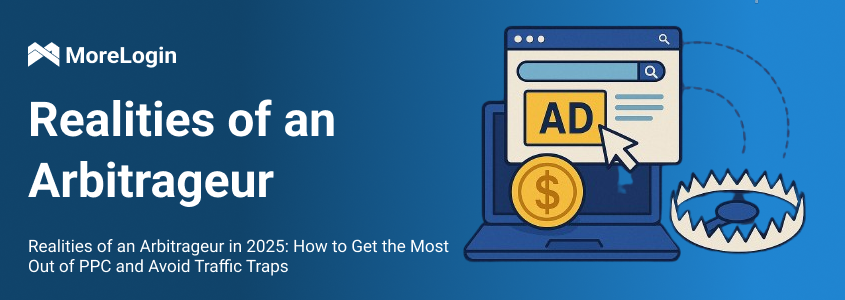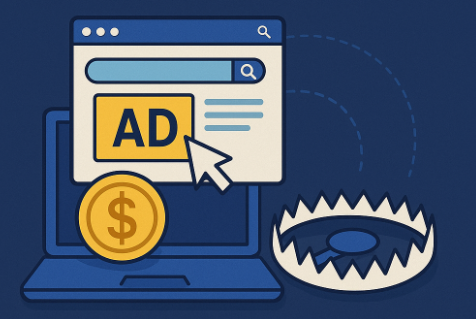
- Product

- Pricing
- Affiliate Program
- Use Cases
- Resource


Manipulation, Fraud, Click Drops, Endless Moderation, and Costly Start-Up Mistakes — The Reality for Every Media Buyer Working with PPC in 2025
But that’s no reason to throw your budget into the void.
We've broken down the main issues faced by media buyers in 2025 and provided proven solutions to help you go from launch to scale — without stress or bans.
Google Ads has gotten smarter — that’s no news. Now, not just user behavior, but the entire account history is under scrutiny: email age, login frequency, registration country, IP, device type, user activity, and even what Google services were used in the past.
A strong account isn’t just one with a positive balance.
It’s an account with:
Tier 1 GEO,
Foreign phone number,
At least one year of history,
Attached foreign cards,
A reliable proxy from the same country.
Regular self-registered accounts rarely deliver good results — they often get banned at the first sign of suspicion. If you want to build trust, forget about manipulation and grey-hat tricks at the start. Google detects those from miles away.
Even if you set up a campaign perfectly and create killer creatives — without a trustable account, it could all end in instant rejection or a total ban. And it’s not just about the algorithm. Google builds a behavioral profile: how old is the account, how naturally it behaves in the ecosystem, what pages it visits, how often it checks email, what other services are accessed.
A "real" and logical behavioral pattern builds trust. Which increases the chances not just of passing moderation but of staying in rotation longer. Real trust isn’t just about balance and proxies — it’s a full digital identity you build in advance. If the algorithm senses even slight inconsistencies, your launch money won’t save you.
That’s why account strategy in 2025 shouldn’t be technical — it should be strategic. It’s like investing in a foundation — invisible, but critical to withstand the first storm.
One common mistake is underestimating the role of publishers in teaser networks and RTB systems. Many push bots to inflate visibility and CTR. Result?
Dead traffic,
Fake stats,
Budget wasted.
What to do?
Work with trusted partners: Google, Yandex, Bing, and major reputable teaser networks.
Use anti-fraud services and trackers (RedTrack, Keitaro, etc.).
Regularly update white/blacklists.
React quickly to suspicious activity.
Every hour you delay cutting off low-quality sources, you waste more budget. Even a single day of hesitation can cost you hundreds or thousands of rubles. Automation isn't a magic fix — yes, trackers help, but manual analysis wins. Look at traffic behavior: page depth, time on landing, funnel actions. If the user just “slips through” with no engagement — it’s not real traffic.
Also, be aware of seasonal fraud spikes — during holidays, promos, or algorithm updates. This is when you need to monitor quality especially closely and not rely solely on dashboard numbers. High CTR with zero CR? That’s the biggest trap.
PPC isn’t a survival game — it’s a cleansing one. Clean your sources, labels, and campaigns. Less noise = higher ROI. That’s the only path to sustainable profit — stop fighting bots, start working with real users.
Offers don’t convert without precise targeting. Forget broad keywords and generic phrases — they’ll drag your budget into the abyss.
To gather keywords:
Use Ahrefs, Semrush, and Keyword Planner.
Look at how people actually search — use conversational keywords, now trending with voice assistants.
Test, test, test — even low-volume keywords can be gold.
And remember: some keywords = instant ban, especially in CIS regions. “Parimatch” is one such trigger. Google hates it. Too direct? Use transliteration or euphemisms.
Google is AI. AI is formulas. Meaning: moderation can be passed — if you understand how it works.
Three levels of review:
Keywords
Ad content
Landing page
Tips:
Make everything unique: text, headlines, URLs.
Don’t relaunch right after rejection — make adjustments first.
If your campaign stalls, don’t panic-adjust your budget — that might make things worse.
Better to start with a $10–15 budget and let the campaign “warm up.” Don’t touch the bids for 2–3 days — then decide how to scale.
Even a small budget can yield results with a smart strategy:
Start with $5–10.
Gradually increase by 10–20% every 12–15 hours.
Don’t change creatives/settings for the first 24–36 hours.
One account = one new campaign per day. No more than 5 total per day.
If a campaign runs well — duplicate it, don’t change it. This avoids algorithm fluctuations and suspicion.
Two approaches:
Wide — more accounts, creatives, and tests.
Deep — one trusted long-living account with steady growth in budget and traffic.
Self-registered accounts live up to $50–300 spend. Rented accounts can last 1–2 months if handled carefully. The higher the account quality — the more scalable your system.
Even with the perfect setup, bans happen. Top 3 causes — and how to avoid them:
Prohibited offer or broken whitepage.
➜ Check local ad policies. Read the platform’s documentation.
Moderation circumvention (bad cloaking).
➜ Use a TDS, trusted antidetect browsers, and manage white/black content on the same domain.
Card-related bans.
➜ If your card was flagged before — Google remembers. Rotate BINs, addresses, and card numbers. Card geo must match account geo.
Freezes are another pain point. If moderation stalls and there are no clicks, it’s a warning sign. Don’t throw money at it — check status with support or relaunch with a different landing page.
Also, don’t forget about the MoreLogin browser — it helps manage proxies smartly: set geo, connection type, save login history, and safely collaborate on accounts. This reduces the risk of being flagged by ad systems.
If you're serious about building a real funnel — don’t skimp on tools. Infrastructure protection is step one to a profitable and stable PPC system.
PPC in 2025 is a game of rules. Those who understand them — scale profitably. Those who ignore them — get bans, freezes, and red cards.